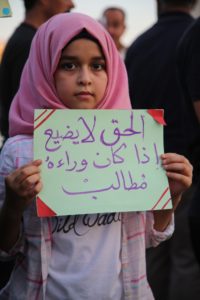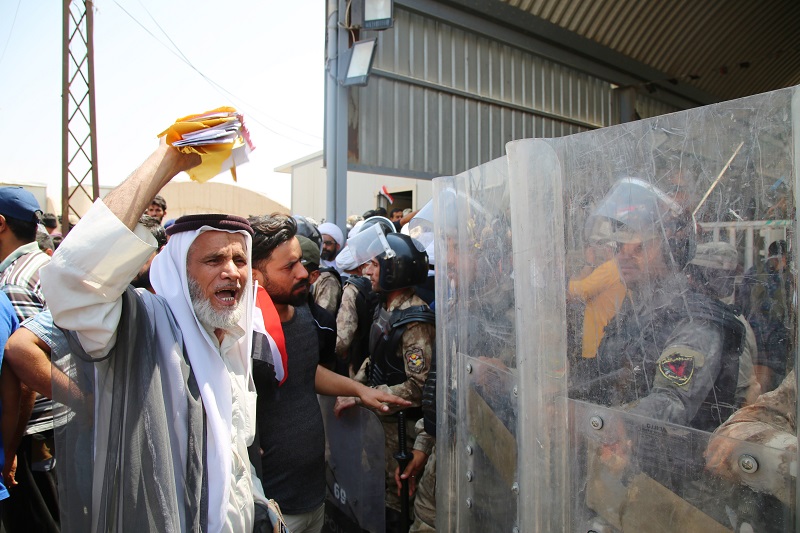“In Basra you see the wealth pouring out of the community every day – from oilfields over there, less than a kilometre from where we are sitting – and then you see the poverty and lack of employment in the villages, while companies import thousands of foreign workers.”
– Ali, who was involved in the mass protests in 2018

Photo by Khalid Tawfik Hadi
Years of discontent escalated into massive protests in oil-rich Southern Iraq in the summer of 2018. The opening up of Iraq’s multi-billion dollar oil reserves to foreign oil companies like BP, Shell, Exxon, Eni and Petrobras to operate, was supposed to bring economic growth and prosperity to all Iraqis. Instead, they have seen little to no benefit; large profits are sucked out of the country and into the hands of foreign shareholders, costs are inflated and much of Iraq’s share is siphoned off by corrupt politicians and warring political factions.
Anger over this corruption and political nepotism, the mass unemployment on the doorstep of such lucrative oil reserves, collapsing infrastructure including power cuts and water shortages, a lack of basic healthcare, and undrinkable water, led to tens of thousands protesting. Some made their protests at the actual gates of BP and the other foreign oil companies themselves.
These protests came only three months after the British ambassador toured BP’s operations in Basra. He reports being impressed to hear “about their social outreach and the work they are doing to employ and professionalise local Iraqis – including a focus on those who lived in close proximity to the oil fields“.
However, according to Ghaith Abdul-Ahad, writing in the Guardian,
‘In the eyes of the local villagers, the heavy traffic rumbling along the narrow road has become a daily reminder of the contrast between the boundless wealth lying underneath their homes and the abject poverty above ground.’
State crackdown
The protests were met with police and army repression, including the deliberate use of live bullets, and violence from paramilitary groups associated with some of the political parties being criticised. Iraq’s High Commission for Human Rights found that between 1 August and 7 September 2018, 20 people were killed, 492 people were injured (including 80 members of the security forces), and another 425 were arrested for participating in the protests. Some were tortured in detention, and some are still missing. In October, a civil society fact-finding team named some of the victims of state violence:
‘One example is the killing of Harith al-Salami. Security forces broke his skull and left him to bleed to death in detention. Kidnappings and killings by other unknown parties also occurred, such as in the case of Ali Abbas, who was found lying on the bank of the Shatt al-Arab, his body showing traces of torture including fractures in his hands.’
__________
Continue to the next section: BP is depleting and polluting Southern Iraq’s scarce water supplies
Return to the introduction: From war to warming: the shameful story of BP in Iraq
